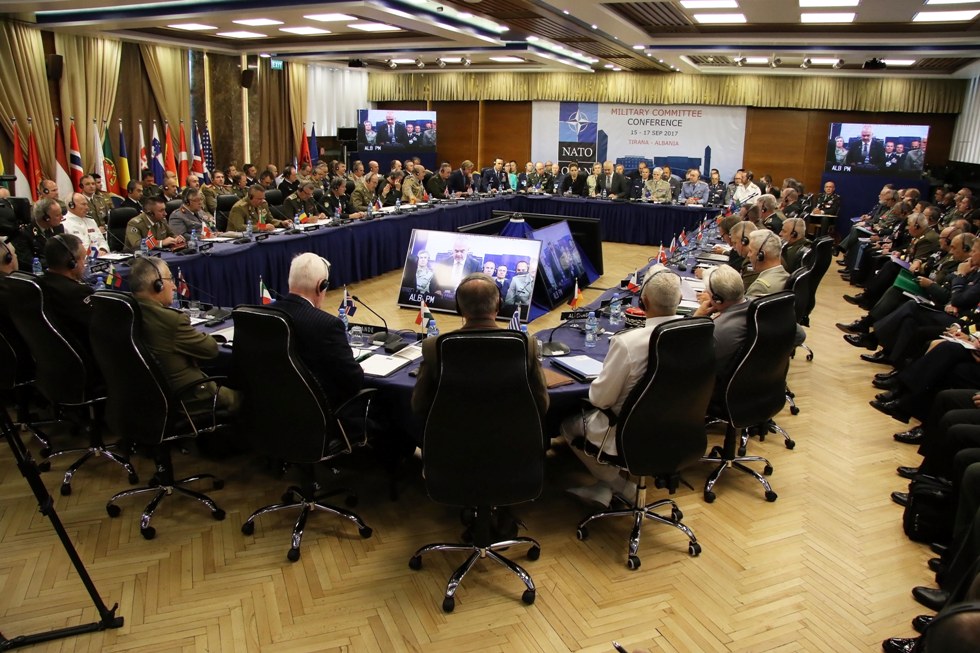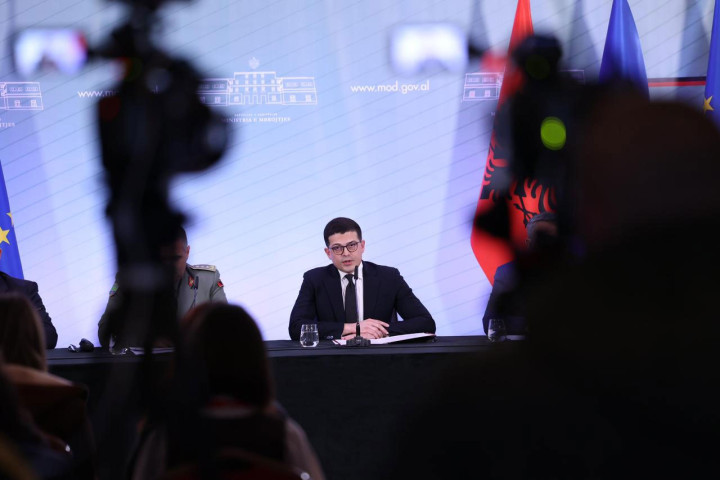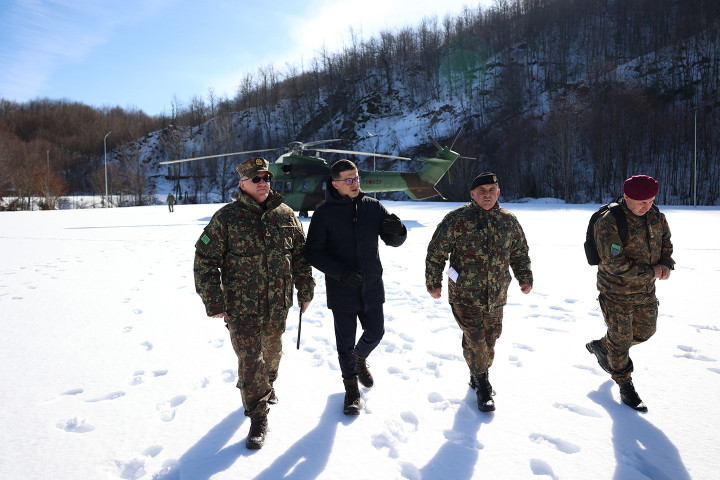Opening remarks by Prime Minister Edi Rama's at the start of the NATO Military Committee Conference
 Good morning!
Good morning!
It was not until long ago that many of you here were seen as the “very bad guys” in this country. But now times have changed and today you are the “best guys”. Thank you for being here. I hope you are enjoying being here together in such wonderful country.
Dear Chairman of the NATO Military Committee, General Petr Pavel,
Dear Generals and Admirals,
Ladies and gentleman,
The first meeting of the NATO Military Committee in Albania, gives this meeting a historical dimension, while, of course, for me and the new Defence Minister of the Republic of Albania, as well as for the Armed Forces of our country, it is a special honour and obviously a great pleasure to have you today here in our country. I don’t think there can be another occasion to have at home so many who bring so much security.
During these years, I have had the opportunity to see from close the considerable transformation of NATO, which, according to Secretary General Stoltenberg, has now entered into the so-called third age.
Two historic summits in Wells in 2014 and then in Warsaw in 2016, as well as the meeting of the heads of state and governments in Brussels in 2017, marked an important transformation of the alliance. The first NATO, the one I mentioned since the very first second, that of 1949-1989, was as alien to official Albania, as it was little by little, year after year, a reference point of hope for the Albanian people. A people who had far more guns than freedom and welfare.
The second NATO, the one of 1989-2014, was ours. Leaping somewhat outside the initial framework, crossing its old borders, NATO interrupted a fierce ethnic cleansing in Europe. The survival of the population and the freedom that Bosnia and Herzegovina and Kosovo enjoy today, are without any doubt the fruit of the second NATO, which included in its mission the freedom of peoples living outside the territorial boundaries of its action.
During this period, in 2009, Albania also experienced the moment of full membership in NATO. This event marked one of the most important milestones in the history of the country, which for many more than decades suffered the consequences of a deeply unwanted separation from the most developed world, or as we have called it back then, the West.
While today, as the third NATO has begun to take shape, Albania is also NATO, and as a member country, it needs to take into account not only the benefits but also the serious responsibilities that derive from NATO membership. The line of instability that marks the eastern and southern boundaries of the alliance, the waves of extremism and terrorism, as well as other global threats, are important factors that determine Albania's security and defence policy, international and regional responsibilities.
As a country where public support for NATO is among the highest, Albania has been politically facilitated to be very active in participating in the Alliance's military engagements. In a way, we have managed to join the Alliance's mission or even other engagements, in co-operation with our NATO members at a supranational level. To the extent that it has been politically easy, just to give you an example, Albania's missions in NATO have not received to date any dissenting vote in the Albanian Assembly, our broad participation in these missions has not been an easy challenge for the country's limited resources.
However, in order to meet our commitments taken in Wells and Warsaw, an ambitious modernization program will also be accompanied by the progressive increase in defence spending. Just as, our Armed Forces will continue to be present in every occasion and front where they will be called. Today they are present in NATO missions in Afghanistan, Kosovo, Latvia and the Aegean Sea. Also, they are part of the EU missions in Bosnia and Herzegovina and Mali. In the future also, we will contribute to the implementation of the broad spectrum of NATO commitments for “Defence and Deterrence”, “Enhanced Forward Presence” and “Projecting Stability Beyond our Borders”.
Generals and Admirals,
One of Albania's important responsibilities in NATO is its concern to contribute to transforming the fragile and problematic Balkan region into a region of peace, democracy, stability and prosperity.
With the entry of Montenegro into NATO, which Albania has strongly supported since the very beginning, except for “Atlantic”, our alliance became completely "Adriatic". The Adriatic Sea has already become an internal sea for the Alliance, giving it control over a very important maritime asset for European security.
However, the NATO map is lacking Bosnia and Herzegovina, Serbia, Kosovo and Macedonia. This area, still not organically included in the European security architecture, is a factor of strategic ambiguity for our Alliance, as well as a territory where third actors see vulnerabilities and opportunities for penetration.
Albania, as a country that borders or interacts in many ways with these countries, has an interest but there is also a special responsibility that this organic part of the region and of our continent, becomes a factor of its sustainability and prosperity. In fulfilling this responsibility as a NATO country, we have tried and achieved, I believe not little, in an ongoing process.
The support to some processes, to begin with the support to the process of consolidating new democracy in Kosovo; then, contributing to the encouragement of Euro-Atlantic policies and factors in Macedonia, as well as the normalization of relations with Serbia, are some of the main directions of Albania's foreign policy.
After the recent elections, it seems that Serbia has given some signals in favour of a new political approach, in relation to NATO and the European Union. However, Serbian insistence on a different security formula from the countries of the region complicates the prospect of a clear and stable architecture.
Macedonia is making efforts to reactivate the integration agenda and resume a new, non-hierarchical relationship among its state-forming peoples, by opening up the country's chances for a European future.
After another round of free elections and in the face of very fragile electoral balances, Kosovo managed to continue consolidating new institutions, as a proof, once again, of the great strength that a clear strategic orientation in favour of Euro-Atlantic integration gives the country.
We are all witness to the serious efforts, inspired by third parties, to destabilize Montenegro, in the face of the unwavering will of the political leadership, but also of the people of Montenegro, to be part of this Alliance. We are also witnessing that in this wave of anti-Atlantic inspiration, other countries in the region are also affected. But we are finally witnessing that all these efforts have received a clear answer thanks to the unequivocal engagement of progressive factors in the region, and above all thanks to the prospect and support of the Euro-Atlantic partners.
This region is today the most meaningful mirror of NATO's extraordinary influence in consolidating the prospect of peace, stability and democracy within the countries that are part of it, or aspire to become part of this important club.
Similar successes have also been identified in the face of attempts for radicalization and extremism in the region. Radical, extremist, and terrorist networks have suffered significant shocks across the region. And now, the best time has come for this momentum to be used to deepen further in the region the integration processes, which are considered as the only option for a secure and prosperous future for all peoples of the region.
We strongly believe that only the full Euro-Atlantic integration of the countries remaining outside, is the way to stabilization, security, prosperity of the Balkans, but also of Europe itself.
On the other hand, we know very well that in addition to our international and regional duties and responsibilities, part of our task is the continuation of important reforms in the domestic sphere, among which those in the field of security are undoubtedly important.
As a small member of a large alliance, we believe that the most important thing is our focus and professionalism to carry out "small tasks". We know well that we neither can nor are required any decisive contribution to the capacity or heavy and complex systems.
But at the same time, we are aware that there is a spectrum of capacities where we can make an important contribution within the Alliance, and it is precisely that part of the spectrum of these capabilities where people are more important than complex systems. We will continue to focus increased attention precisely in this segment.
The infantry, intelligence and Special Forces capacities will be our priority for further development in the future. As a country with a maritime profile, Albania will pay attention to capacity expansion to better control its maritime and airspace environments.
Meeting the objectives of increasing defence spending, in view of meeting our commitments within NATO, is a real challenge to the country's limited resources. And in order for defence spending not to become an unaffordable burden for the country, we intend that through an enhanced role for the benefit of the public, the Armed Forces can transform today, and not just tomorrow, part of the budget protection in a form of services. This means that through the creation of dual capabilities, the Armed Forces will have an enhanced role in the field of Civil Emergencies, the control of land, sea and air space and the support of public order authorities.
Crossing over to a completely professional force has brought as a side effect, also the danger that the Armed Forces break away from an organic communication and exchange with society. We believe that many positive functions can be compensated by the construction of a spare component for the Armed Forces. This component, which unlike most NATO countries, is completely missing in our country, will be a new opportunity by which the Armed Forces will build a new communication bridge with society, will benefit from specific capacities and greater professional expertise, and contribute to completing the catalogue of necessary capabilities to complete the mission both domestically and internationally.
Following a determined course to deepen comprehensive reforms in the country, where Justice Reform is undoubtedly leading, pursuing an open, integrated policy in the region, bearing our burden within NATO commitments, as well as by modernizing our Armed Forces, we believe that we will be able to further improve the overall peace and security climate and serve our citizens better.
Albania finds it difficult to do great things, but we can do small things with dedication and great professionalism. Apparently, Mother Theresa was thinking about Albania when she said "Not all of us can do great things. But we can do small things with great love and dedication."
Thank you very much!
---
Articles from Newsroom
Monday, 26 January 2026



Defence Minister Vengu hosts Belgian counterpart: Cooperation to strengthen our capabilities
Tuesday, 20 January 2026
Albanian Air force trains with the U.S. Air Force, focusing on rapid crisis response
Monday, 19 January 2026